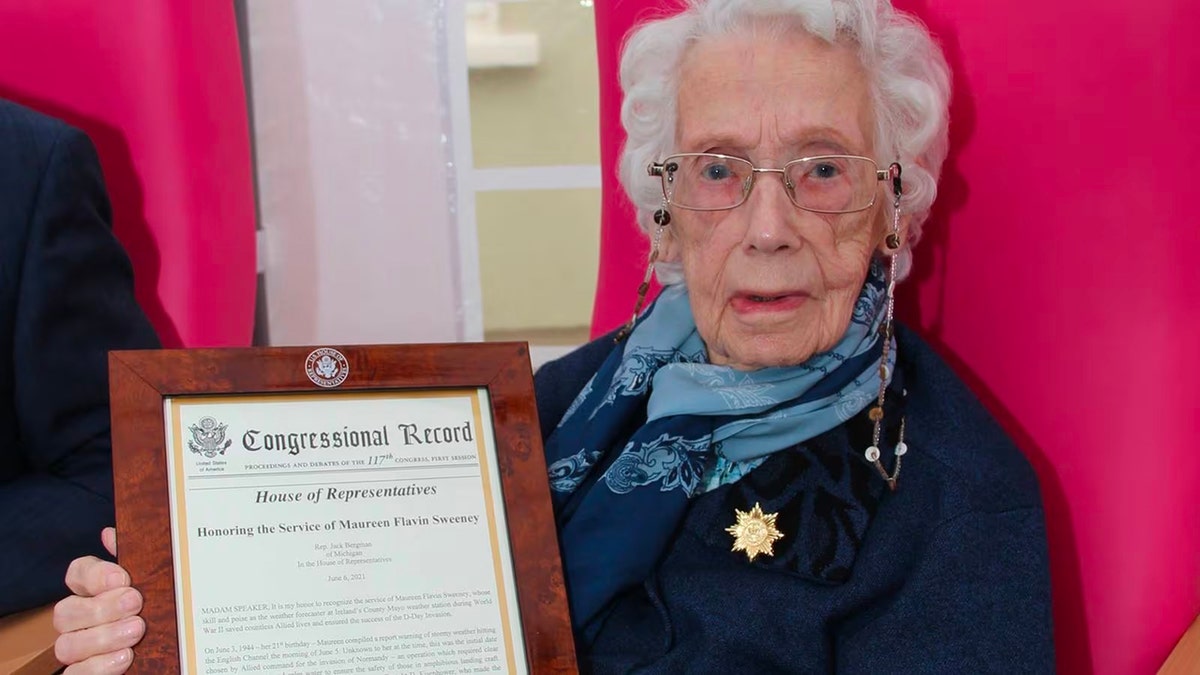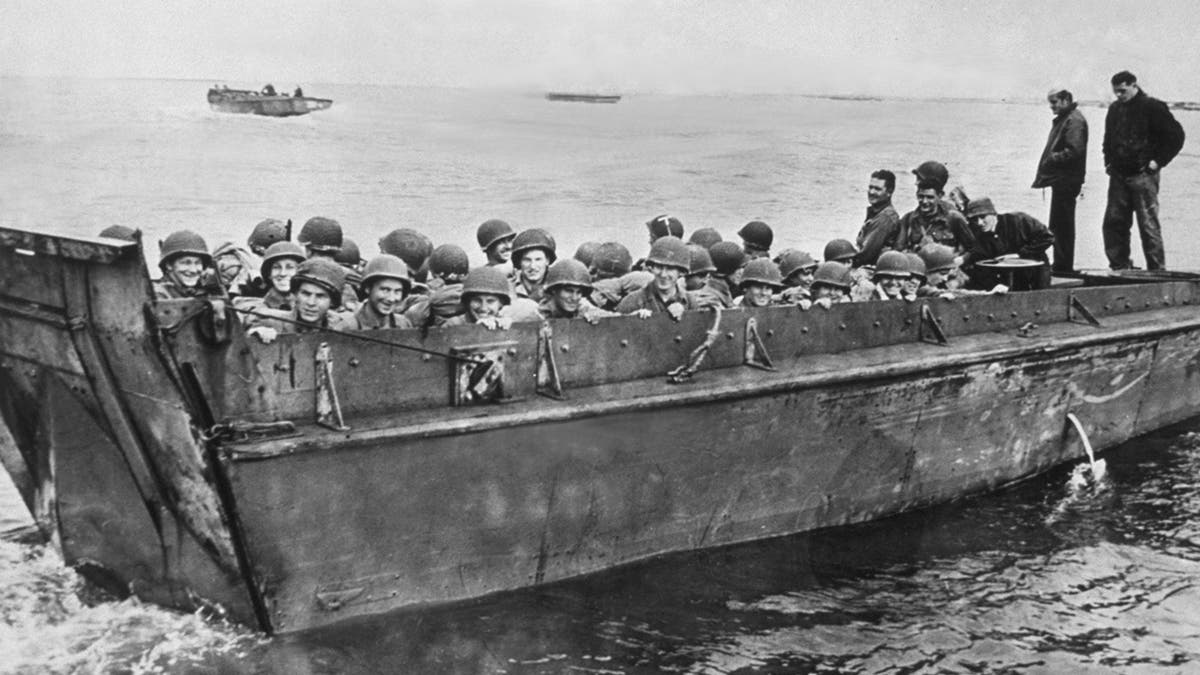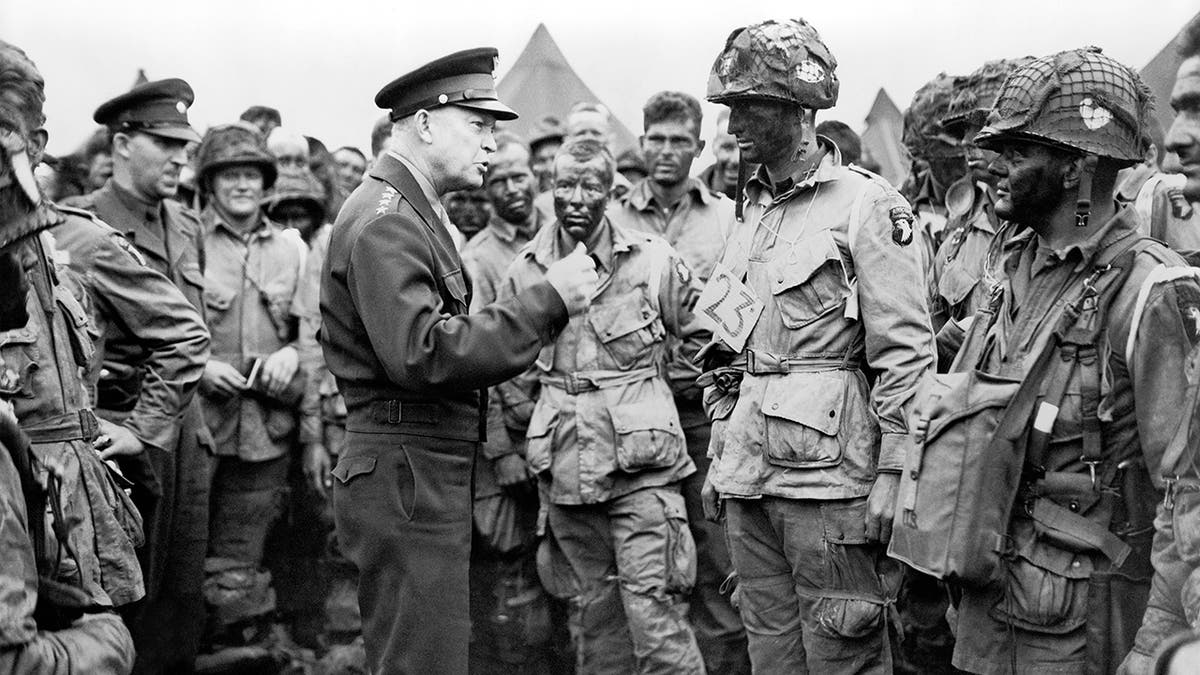Janice Dean gives the story behind her new book 'I am the Storm'
Fox News senior meteorologist gives viewers a preview of her new book on how she took on former New York Gov. Andrew Cuomo on 'The Five.'
March is Women’s History month, and I wanted to pay tribute to a woman whose story inspired me to write a book. My book "I am the Storm, Inspiring Stories of People who fight against overwhelming Odds" features people whose journeys took them to a place where a task, challenge or decision affected their lives, and others whether they realized it at the time or not. For Maureen Flavin Sweeney, it was her weather report that helped win a world war.
Maureen grew up in the southern part of County Kerry, Ireland. At the age of eighteen, she took a job as a post office assistant in Blacksod, a hard-to-get-to lighthouse in the southern end of the Mullet Peninsula.
According to the Irish Independent, "Blacksod was the first land-based observation station in Europe where weather readings could be professionally taken on the prevailing European Atlantic westerly weather systems." During World War II, the Republic of Ireland was neutral. But it did allow the sharing of weather information with Great Britain.
Maureen spent quite a bit of her time writing down the atmospheric conditions. She really didn’t understand what for, but she was diligent about her work and getting it right.
It was on her twenty-first birthday, on June 3, 1944, at 1:00 a.m. that Maureen was making her report. One crucial instrument that has been used to study weather since the 1600s is a barometer. It measures the atmospheric pressure, which gives us clues about the conditions we’re going to experience.

Maureen Sweeney of Ireland, then 98,was honored by the U.S. House of Representatives in 2021 for her role in ensuring the success of the D-Day invasion in 1944. Sweeney's storm prediction saved commanders from launching the invasion too early. She died Dec.17, 2023 at 100 years old. (Tom Reilly)
On that morning, Maureen’s research was showing that the air pressure was dropping rapidly. That meant there was something out there in the Atlantic, a nasty storm that would hit the Irish coast, move over the United Kingdom, then down over the channel into Normandy, France. Miss Flavin compiled the weather conditions and then sent it to Dublin.
What she didn’t know at the time was that information was then forwarded to Dunstable, England, where the meteorological headquarters were stationed. Captain James Martin Stagg, the chief meteorologist for US General Dwight D. Eisenhower, was helping plan the Allied invasion. Stagg saw Maureen’s hourly updates and had someone call the Blacksod post office directly.
I wish I had met Maureen in person but I feel so grateful that I was able to tell her story. Many have never heard of her and when I do get the chance to recognize her, people tell me they get chills and sometimes tears in their eyes.
Stagg and his staff saw what Maureen was sending them: a drop in the barometric pressure indicating a strong area of low pressure. The Supreme Headquarters Allied Expeditionary Force (SHAEF) in England was forwarded her weather reports, which were checked and double-checked.
Maureen said that when it came to the invasion, there were things they could put in place, but one thing they had no control over was the weather.
"They had it all worked out to the nearest detail, but our weather report put the first spoke in the wheel."
The rest is history.
General Eisenhower decided to postpone D-Day by one day, so instead of going ahead on the fifth, Operation Overlord (the code name for the invasion) took place on the sixth of June.
Maureen had no idea of the gravity of their reporting. If it weren’t for their accurate prediction, Allied forces would have gone ahead on the fifth of June and the invasion would have been a disaster.
It wasn’t until decades letter that Maureen Flavin Sweeney realized how crucial her observations were.
"There were thousands of aircraft and they couldn’t tolerate low cloud. We’re delighted we put them on the right road. We eventually had the final say!"

FILE – June 6, 1944: American soldiers on a landing craft on their way to the Normandy beaches, during the invasion of Europe. (Photo by Keystone/Getty Images)
Maureen was honored in a ceremony in June 2021, marking the seventy-seventh anniversary of D-Day and the role she played in helping change the course of the invasion. Her name is now listed in the US Congressional Record for the now-famous weather report she delivered that "ultimately saved countless lives."
CLICK HERE FOR MORE FOX NEWS OPINION
Rep. Jack Berman, from Michigan, a retired three-star Marine Corps general who holds the highest military rank of any current member of congress, wrote on the seventy-seventh anniversary of the D-Day landing that he was honored to recognize the service of Maureen Flavin Sweeney.
"Her skill and professionalism were crucial in ensuring Allied victory, and her legacy will live on for generations to come."
Maureen Flavin Sweeny was 100 years old when she died December 17th, 2023 in a nursing home in Belmullet, Ireland very close to the post office where she used to work. I wish I had met her in person, but I feel so grateful that I was able to tell her story. Many have never heard of Maureen Sweeny, and when I do get the chance to recognize her, people tell me they get chills and sometimes tears in their eyes.

FILE – General Dwight D Eisenhower talking with American paratroopers on the evening of June 5, 1944, as they prepared for the Invasion of Normandy, Greenham Common, Berkshire, England, June 5, 1944. The men are part of Company E, 502nd Parachute Infantry Regiment, at the 101st Airborne Division's camp in Greenham Common. (Photo by Underwood Archives/Getty Images)
I think of Maureen often when I’m delivering a forecast that might help change someone’s plans or even make them more aware of rough weather ahead. A young woman delivered a forecast that helped guide the way for Europe’s liberation, and changed the world. There is no doubt in my mind that one person can make a difference.
CLICK HERE TO GET THE FOX NEWS APP
The trajectory of history was changed forever because of one woman’s hard work, determination, diligence, and a precise weather report she delivered.
That deserves to be celebrated and shared.











































